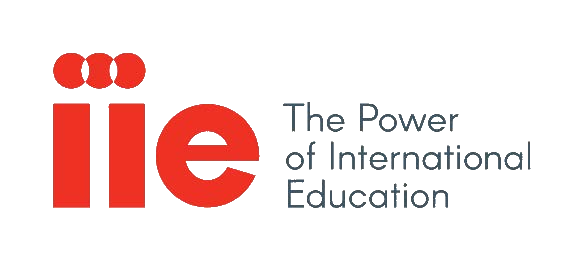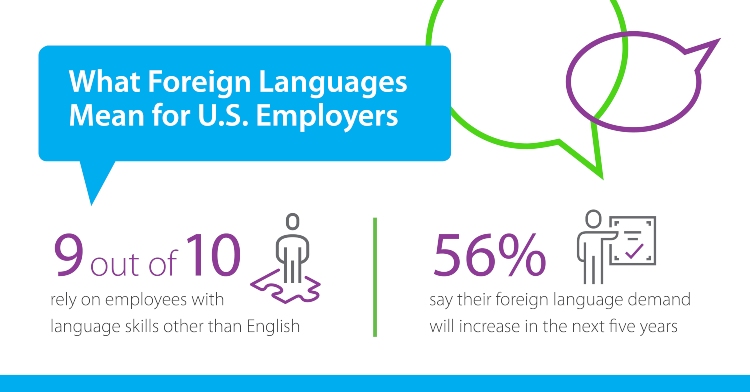By Erin Whelchel, Outreach Manager, ACTFL

With language skills in urgent and rising demand among U.S. employers, the next generation of Americans is relying more than ever before on multilingualism, cultural competence, and other 21st century skills in order to succeed both personally and professionally in our increasingly interconnected and global society. And as more students are seeking authentic ways to build these highly sought-after skills, we are seeing programs across academic departments adapt to allow for a more interdisciplinary understanding of what it means to be prepared to enter the U.S. workforce today.
As a Generation Study Abroad Commitment Partner, one of ACTFL’s 2020 goals has been to increase visibility of study abroad programs—an objective closely aligned to the broader goals of our Lead with Languages public awareness campaign since its launch.
In a 2017 report on the state of U.S. language education, the American Academy of Arts and Sciences’ Commission on Language Learning lists among five main recommendations the U.S. Congress to “Promote opportunities for students to learn languages in other countries by experiencing other cultures and immersing themselves in multilingual environments”—including study abroad experiences, international internships, and needs-based funding opportunities.
Along with providing curated lists of resources and links to study abroad programming options, summer language programs, and federal and private scholarship opportunities on our campaign site, the Lead with Languages blog and social media platforms actively feature an array of study abroad testimonials from language students and multilingual professionals alike. In sharing these stories, we are building an archive of profiles by “big siblings” who can encourage, reassure, and motivate young people to follow in their footsteps.
To date, blog contributors encompass alumni from programs including the Boren Awards, Congress-Bundestag Youth Exchange (CBYX), Critical Language Scholarship (CLS), Freeman-ASIA, Fulbright U.S. Student Program, Gilman International Scholarship, National Security Language Initiative for Youth (NSLI-Y), and Rotary Youth Exchange Program—plus several more national and university-specific opportunities.
In dozens of testimonial posts, alumni describe their gratitude for study abroad experiences that challenged them not only to improve their language skills but also to form new perspectives on their relationships with others, reevaluating their role in the world, developing greater patience, and building self-esteem and confidence.
In their words:
“I can’t advocate enough for how much studying abroad will change you not only as a student, but as a person. There is something special about challenging yourself to immerse yourself in a different culture, let alone one that doesn’t speak your native tongue. It will teach you to be more tolerant, patient and understanding of the world around you.”
– Bo, DePauw University student (studied in Italy)
“Studying abroad was one of the best experiences of my life, and I think that every student learning a language should do it. You really have to step out of your comfort zone and I feel that the most growing and learning happens when you do step out of your comfort zone.”
– Ena, Aquinas College graduate (studied in Germany)
This spring, ACTFL and Lead with Languages published Making Languages Our Business, a report indicating that 90 percent of the 1,200 U.S. employers surveyed rely on employees with language skills other than English. In addition to key findings across sectors of the economy and significant projected demand, the report also presents seven actionable recommendations for ways employers may contribute to fostering a robust future multilingual workforce.

Image from Making Languages Our Business, ACTFL and Lead with Languages
Among these items is to identify and cultivate a pipeline of multilingual talent—particularly in seeking partnerships with colleges and universities with international studies, foreign language, and study abroad programs, and thereby promoting the functional use of language skills in law, engineering, healthcare, tourism, social services, and other sectors. U.S. businesses must recognize their role in supporting this pipeline—both in practice and policy efforts—if they expect to fill their recruitment goals in the years to come. And such businesses know that multilingualism is just one aspect of the many self-affirming benefits to be reaped from learning a language at home or abroad: enhanced interpersonal skills that are an asset to any enterprise.
Combined with domestic opportunities to use language and cultural skills outside of the traditional classroom, study abroad programs are a vital element in our national movement to promote language learning and a clear step toward a more empathetic future. We look forward to sharing even more study abroad alumni stories in partnership with Generation Study Abroad and other initiatives as our campaign moves forward.

Erin Whelchel is the Outreach Manager at the American Council on the Teaching of Foreign Languages (ACTFL) and as such heads AFTFL’s Lead with Languages public awareness campaign. A passionate Francophile, she is an alumna of Smith College and the Teaching Assistant Program in France (TAPIF). Follow updates, student and professional profiles, and advocacy efforts from Lead with Languages across social media channels @LeadWLanguages. ACTFL is a Generation Study Abroad Commitment Partner. Representing an alliance of over 800 U.S. and international colleges and universities, educational associations and organizations, and country partners, these Commitment Partners have pledged strategic actions in support of the Generation Study Abroad initiative’s goal to promote equity and increase access for U.S. student participation in study abroad since 2014.